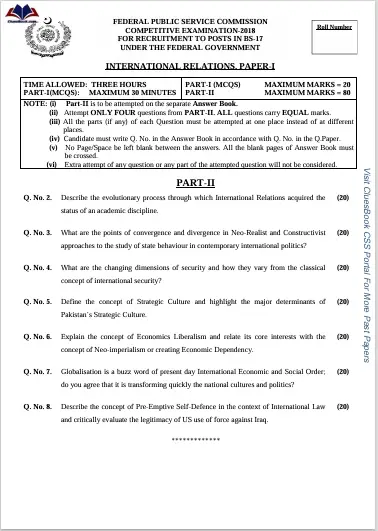Download CSS Past Papers of International Relations 2018
Here you can download CSS Past Papers of International Relations. The CSS International Relations (IR) paper is one of the most selected optional subjects in the CSS exam. Reviewing past papers is a proven strategy to understand trends, important areas, and how to structure your answers effectively. In this blog, we provide the CSS IR 2018 paper in PDF format, along with detailed guidance on its structure and key themes.

Why Use Past Papers?
Past papers help candidates:
- Grasp the question format and style used by FPSC
- Identify repetitive topics and areas of focus
- Enhance analytical and answer-writing skills
- Prepare for unexpected or challenging questions
- Practice time management under exam conditions
Overview of the 2018 IR Paper
The 2018 paper followed the typical CSS IR paper format:
Objective Section (MCQs)
- 20 MCQs
- Topics covered:
- Key IR concepts and terminology
- Theories of International Relations
- United Nations and major global organizations
- International treaties and agreements
Subjective Section (Descriptive Questions)
Candidates were required to answer 4 out of several questions. Main topics included:
- Classical vs. modern theories in IR
- Role of diplomacy in international politics
- Foreign policy of Pakistan in a changing regional context
- Impact of globalization on state sovereignty
- Challenges to world order in the 21st century
About the CSS
The CSS (Central Superior Services) Competitive Examination is a rigorous federal-level test administered by the Federal Public Service Commission (FPSC) to select candidates for prestigious civil service roles across Pakistan. The exam’s rules and regulations, covering age limits, eligibility, subjects, and quotas, are detailed in the official CSS Rules section on the FPSC’s website.
The CSS Exam Rules, issued by FPSC Pakistan, outline eligibility criteria, age limits (21–30 years), and a maximum of three attempts for candidates. The exam includes written tests, a medical exam, a psychological assessment, and an interview. Rules also define quotas, disqualification grounds, and subject selection for a fair recruitment process.
Key Themes in the 2018 Paper
Focus on these major areas when reviewing this paper:
- IR theories and paradigms (Realism, Constructivism, etc.)
- Foreign policy and diplomacy
- Regional politics and Pakistan’s role
- Globalization and its effects
- Power transition and emerging world order
How to Use This Paper for Preparation
- Examine question wording to understand what is being asked
- Practice writing structured, theory-based answers
- Relate answers to global and regional current affairs
- Use past papers for mock exams
- Review answers with mentors or seniors for feedback
Recommended Study Resources
For thorough preparation, consider these books:
- International Relations by Joshua Goldstein & Jon Pevehouse
- Global Politics by Andrew Heywood
- Pakistan’s Foreign Policy by Abdul Sattar
- IR Solved Past Papers & MCQs (CSS-focused editions)
Download Section
Click below to download the Past Papers of International Relations CSS pdf file
- Always align your answers with current affairs and theoretical frameworks.
- Practice writing time-bound answers using past papers.
- Follow key developments in global politics, economic trends, and regional issues, especially in South Asia.
Use it for structured answer writing and revision.
The CSS IR 2018 paper offers valuable insight into the FPSC’s questioning style and key focus areas. Aspirants should use it to build their understanding of core IR topics and develop a critical approach toward global issues.
Practice consistently and link theory to practice for maximum impact.

